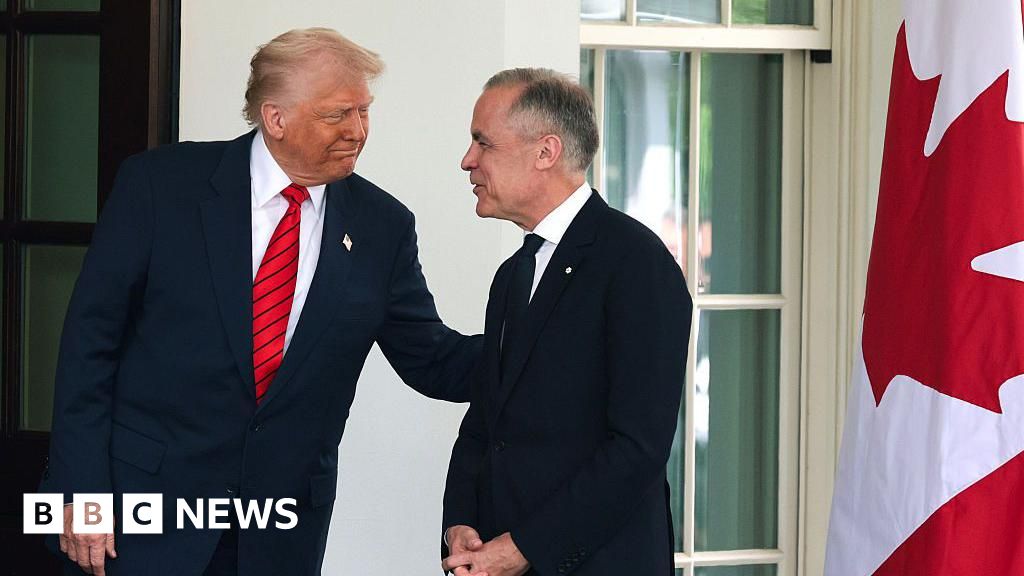ARTICLE AD BOX

19,354
viewing this page
With analysis from Anthony Zurcher, Will Vernon and Helena Humphrey in Washington DC and James Waterhouse in Kyiv
Related Video and Audio

Got a TV Licence?
You need one to watch live TV on any channel or device, and BBC programmes on iPlayer. It’s the law.
Live Reporting
Edited by Tiffany Wertheimer
All times stated are UK
Vladimir Putin is playing a waiting game in Ukraine

Copyright: Reuters
It’s six months to the day since President Biden first sought congressional approval for a new aid package for Ukraine.
Since then, very little American assistance has been reaching the frontlines. That’s been a helpful boost to President Putin’s forces, who are now on the offensive in Ukraine.
The reluctance to swiftly approve assistance to Kyiv reflects a wider trend of “Ukraine fatigue.”
Surveys show that in America as well as in Europe, public support for continuing to assist the Ukrainians with money and weapons has dropped, although remains above 50% in most countries.
Dwindling western support is exactly what Vladimir Putin is hedging his bets on.
The Kremlin leader has made a calculation: that, over time, Russia can outlast the resources and morale that both Ukraine and its partners have at their disposal.
Ukraine’s backers in Washington are hoping that today’s congressional vote will remind people of the critical need to maintain support for Kyiv.
Ukraine bill passed easily after bi-partisan deal

Anthony Zurcher
BBC North America correspondent
After months of delay, Ukraine aid passed the House of Representatives by a comfortable margin, 311 to 112. But those numbers obscure the increasingly sharp partisan divides on the issue.
While all 210 Democrats voted in favour of the $61bn aid package, more Republicans were against the legislation than in favour of it, 112 to 101.
That could spell trouble for Republican Speaker of the House Mike Johnson, who allied with Democrats to overcome procedural obstacles and bring the aid package to a vote in this rare Saturday session.
It also is a sign that Republican legislators in the House are increasingly sensitive to the shifting attitude from voters in their party toward Ukraine during this election year.
While the billions of dollars in new aid is expected to sustain the Ukrainian war effort in the months ahead, if Republicans gain more power in Congress – or take back the White House – further US support seems increasingly unlikely.
BreakingPASSED: Israel military and humanitarian aid package passes the House
The House has also now passed a funding package worth $26.4bn (£21.3bn) for Israel.
It includes military aid, including replenishing air defence systems, as well as funding for humanitarian measures.
It was the final big vote of today. Stay with us while we bring you all the analysis and reaction to these important votes.
Zelensky reacts to 'vital' US House vote

Copyright: EPA
Ukrainian President Volodymyr Zelensky has just posted a statement on X, welcoming the result. He writes:
"I am grateful to the United States House of Representatives, both parties, and personally Speaker Mike Johnson for the decision that keeps history on the right track.
"Democracy and freedom will always have global significance and will never fail as long as America helps to protect it.
"The vital US aid bill passed today by the House will keep the war from expanding, save thousands and thousands of lives, and help both of our nations to become stronger.
"Just peace and security can only be attained through strength. We hope that bills will be supported in the Senate and sent to President Biden’s desk. Thank you, America!"
Ukrainian flags are being waved in the chamber

Copyright: House of Representatives
Supporters began waving Ukraine flags, cheering and clapping even before the result was formally announced, when it became clear that the Ukraine aid package had finally been approved.
This is a key moment for Kyiv, and its supporters in the US have been pushing for this vote to happen for months.
It's not common to see such jubilant scenes in the House but this vote has been a long time coming.
BreakingPASSED: Ukraine aid package
The House has voted in favour of giving Ukraine the $60.8bn (£49bn) military aid package.
The final result was 311-112.
This marks a pivotal moment for Ukraine, which desperately needs the military assistance as it struggles to fight against Russia's invasion.
The Senate is expected to approve the measure in the coming days, before it is signed into law by President Biden.
Officials have told US media that some of the munitions could reach Ukraine within a week.
Anti-Ukraine funding amendments all fail
In the last few minutes the House has been voting on a series of amendments designed to water down or kill the Ukraine funding bill.
All have failed - and now we're minutes away from the result on the main vote.
Ukraine vote up next
The vote we have all been waiting for - and one that will be watched very carefully from Kyiv.
The $60.8bn (£49bn) military aid package will provide Ukraine with weapons and other “lethal assistance” to help it fight against Russia.
The result is expected any moment.
BreakingPASSED: House votes for Indo-Pacific aid package designed to deter China
The House has passed an $8.1bn aid package for the Indo-Pacific region.
The funding is mainly designed to deter Chinese aggression in the region, particularly against Taiwan.
You can read more about China and Taiwan in this really simple guide.
BreakingPASSED: TikTok measures, sanctions and Russian asset freezes
The House has voted to pass a range of measures which were pegged onto the larger funding bills.
It includes new rules that could see the US ban TikTok unless its Chinese parent company sells the app.
It also includes new sanctions on China, Russia and Iran, as well as provisions to sell frozen Russian assets to generate revenue for Ukraine.
Crucial House votes are under way
Voting has begun - stick with us while we bring you the key results.
How stalled TikTok measures got to the House floor today

Anthony Zurcher
BBC North America correspondent

Copyright: Reuters
Members will soon vote on the mixed bag of measures, which includes a crackdown on TikTok in the US.
But how did a bill to force the sale of TikTok get looped in to a House foreign aid package?
There’s an old saying that legislation, like sausage, is something you shouldn’t watch being made.
In Saturday’s legislative sausage-making, the three key foreign aid components – military support for Ukraine, Israel and Taiwan – are mixed in with a grab bag of other items, including a provision allowing for the confiscation of Russian assets, new sanctions on Iran, Russia and China and the TikTok measure.
The move is designed to provide a bit of a “sweetener” for members of the House who might otherwise be inclined to vote against the package.
It’s also a convenient way of forcing the Senate’s hand.
Two months ago, a large House majority passed a stand-alone measure to require the Chinese company ByteDance to sell TikTok. That legislation has languished in the Senate since then.
By including the TikTok provision in this aid package, senators who urgently want to provide Ukraine and Israel with aid will have no choice but to also swallow the TikTok ban.
Senators may prefer a different flavour of sausage, but that’s the only one the House is serving on Saturday.
Here's what's happened in crucial US aid vote so far

Copyright: House of Representatives
If you're just joining us, the House of Representatives has been debating several aid packages - which includes one for long-awaited military funding for Ukraine. A series of crunch votes will get under way soon.
Just joining us? Here's what you need to know:
- House Democratic leader Hakeem Jeffries praised his party and some Republicans, after months of negotiations led to a rare bi-partisan coalition forming in support of tens of billions of dollars of overseas military aid
- Four key votes - which are expected to start soon - will see the House vote on aid for Ukraine, Israel and the Indo-Pacific region. The fourth vote is for an assorted collection of measures, which includes a crackdown on TikTok in the US
- In an unusual move, Republican Speaker Mike Johnson is allowing separate votes on the key planks of the aid bill in an effort to get it passed - but the move has left him exposed to hard-liners in his own party
- Marjorie Taylor Greene, a pro-Trump congresswoman who is bitterly opposed to Ukraine funding, has proposed an amendment designed to kill the bill, but it is expected to fail
- The $60.8bn (£49bn) of aid for Ukraine is expected to pass, after months of warnings that without it, the balance of the war could tip irreversibly in Russia's favour
- So far this afternoon, the House has heard speeches from both sides of what has become a highly contentious political divide
We'll be following proceedings and bringing you updates and analysis throughout.
A make-or-break moment for the Speaker

Anthony Zurcher
BBC North America correspondent
Image caption: Today's vote leaves Mike Johnson in a potentially perilous political situation
Copyright: Reuters
Since his unlikely elevation to the top job in the House of Representatives last October, Republican Mike Johnson has had to rely on Democratic support for key pieces of legislation, including funding government operations.
The House Speaker is again turning to Democrats, because he needs their help in passing today’s foreign aid package.
Democrats also provided the necessary votes earlier this week to overcome procedural obstacles to progress the legislation – a first in modern congressional history.
Johnson has said he is pushing the aid bill forward despite vocal resistance from some Conservatives because it’s the right thing to do.
It may come at a high price for him, however.
Three House Republicans are already calling for him to be ousted as Speaker. They may even force a vote on the matter next week.
Some Democrats have said they’re willing to protect the speaker in such a circumstance.
But a Republican leader relying on Democratic support to hold on to power may not be a sustainable position.
House currently voting on immigration bill

Anthony Zurcher
BBC North America correspondent
Before the House of Representatives gets to vote on the foreign aid packages, they’re currently voting on a hardline conservative immigration bill that includes new funding for border security and changes to the political asylum process.
Because Republicans were not able to agree on procedural step before this vote, passing this border bill would require a two-thirds majority in the House – a hurdle it will not clear.
It’s failure will not have an impact on the upcoming foreign aid votes.
Republicans had initially demanded that immigration reforms be linked to Ukraine aid, but conservatives – with the backing of former President Donald Trump – turned against a bipartisan package that was negotiated in the US Senate earlier this year.
Israel funding is 'long overdue', says Democrat Schultz

Copyright: House of Representatives
Representative Debbie Wasserman Schultz has just spoken strongly in favour of the "long overdue" aid package for Israel, which is also set to be voted on today.
Reflecting on the events of 7 October, the former Democratic Party chair says Hamas were responsible for the deadliest day for Jewish people since the Holocaust, recounting how people were murdered, raped and kidnapped during the attack.
She says Hamas's attack amounted to "declaring war on humanity" with "maniacal terrorism".
Schultz speaks in favour of the humanitarian aid included in the package, telling the House "the Palestinian people... are also victims of Hamas".
A handful of amendments being debated

Anthony Zurcher
BBC North America correspondent
The House is currently debating the various foreign aid packages, including whether to make any changes, known as amendments, to them.
Only a handful of amendments will come up for a vote later today - ones that were agreed upon by the powerful House Rules Committee late on Thursday night.
Some would effectively kill pieces of the aid package.
For instance, Georgia Congresswoman Marjorie Taylor Greene has authored a change that would reduce the amount of US aid to Ukraine in the package to zero.
Another, by Kat Cammack of Florida, would eliminate all non-military support for Ukraine.
Other amendments would require the US government to issue new reports on Chinese tech companies and assets held by Iran that might be exempt from sanctions. A few uncontroversial amendments make only minor modifications to the language of the legislation, for procedural reasons.
In total, the House will vote on nine amendments, in addition to the four final votes on aid to Ukraine, Israel and Taiwan and the grab-bag package that includes forcing the sale of TikTok and confiscating Russian assets.
What’s the current situation in Ukraine?
Image caption: Barely any of Ukraine's power plants have escaped Russia's drone and missile attacks
Copyright: Reuters
Today marks 2 years, 1 month and 27 days since Russia launched its full-scale invasion of Ukraine.
In February, Ukrainian troops withdrew from the eastern town of Avdiivka, which had been besieged by Russian forces for months.
Significant territory was surrendered to Russia, and it marked a serious blow to Ukraine’s fight in the war.
Ukraine’s President Volodymyr Zelensky said the order to pull back was taken to save soldiers’ lives, and blamed faltering Western weapons supplies.
For months, while US politicians have squabbled over support for Ukraine, soldiers have struggled to defend their front lines from the Russian advance because of a shortage of shells, rockets and air defences.
Recently, Russia has increased its drone and missile attacks on Ukraine’s energy infrastructure.
Officials in Ukraine say they can "count on one hand" the thermal and hydro power plants across the country that are not yet badly damaged or totally destroyed. As Ukraine scrambles to repair what it can, and keep the electricity flowing to homes and industry, Russia's assault has not stopped.
Ukraine’s future depends on US help - top military officer
Jonathan Beale
Defence correspondent

Copyright: Getty Images
The most senior US military officer in Europe has already warned congress that Ukraine could lose the war without further American military support.
General Christopher Cavoli also warned that Russia had been faster at replacing its losses than many had expected.
The absence of US military supplies for the past six months has left Ukraine in a precarious position on the battlefield. And America is the key supplier of the ammunition Ukraine needs most – Air Defence interceptors, artillery ammunition and longer range missiles – like HIMARS.
Unlike most of Europe, the US has significant stockpiles. Transfers could likely begin soon after approval – such is the urgency of Ukraine’s needs.
The US has also been quicker at ramping up production. In contrast, Europe’s defence industry has been sluggish to respond to the additional demands.
Of the $60bn promised for Ukraine, just over a third would go towards replenishing US ammunition. Around $14bn would help Ukraine buy new weapons.
But even if the military aid is sent quickly, it could still take weeks to halt the recent Russian gains on the battlefield. And if the US military aid taps are turned back on, Ukraine still needs more troops to replace its losses - a problem it’s been just as slow to address.
Why this House vote is unlike any other

Anthony Zurcher
BBC North America correspondent

Copyright: Reuters
It’s taken months for Ukraine aid to get this far - a vote in the House of Representatives.
For it even to get to this point has taken a rare demonstration of bipartisan cooperation in the face of stiff resistance from a group of Conservatives.
House Speaker Mike Johnson has devised an unusual strategy for getting the aid package through his chamber.
By bringing separate votes on each individual piece of aid – for Ukraine, Israel and Taiwan – the Republican leader is allowing individual legislators to vote against parts they don’t like, without sinking the whole package, which ultimately will be combined and sent to the US Senate for its approval.
That’s a fairly dramatic departure from normal procedure in the House of Representatives, where the speaker traditionally has a tight grip on every step of the legislative process.
Johnson’s Republicans have only the slimmest majority in the chamber, however – one that contains a handful of conservatives willing to challenge his authority at every turn.
That has turned House tradition on its head, forcing the speaker to break with convention, work with Democrats and defy members of his own party to get this legislation over the line.

 1 year ago
58
1 year ago
58


















 English (US) ·
English (US) ·